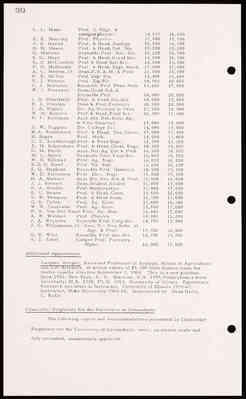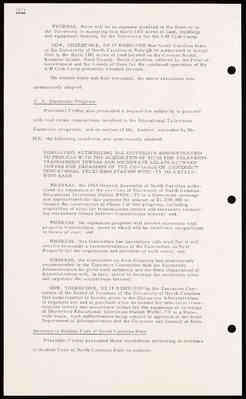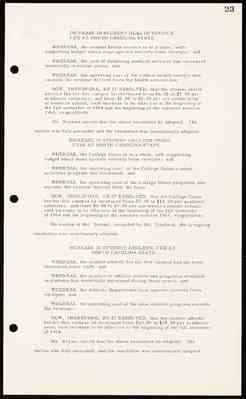Pages
21
Appointments
Barbara Clawson as Research Assistant Professor in School of Home Economics, at annual salary of $7,200 based on nine months of service for a period of three years, effective September 1, 1964. Born 1935 in Iowa. Single. B.S. Iowa State University 1957; M. S. University of North Carolina at Greensboro 1962. Experience: Taught in Mason City, Iowa, public schools 1960-61; Graduate Assistant in Home Economics Education, UNC-G 1962- ; Assistant Professor of Home Economics, New York State University, Oneonta, New York. Interviewed by: Dean Naomi Albanese.
Joan Gregory, as Lecturer in Art for the academic year 1964-65, at a salary of $8,500 based on nine months of service, effective September 1, 1964. Appointment made with the understanding that rank shall be Assistant Professor when doctor's degree is received. Born 1930. Single. A. B. Alabama College 1952; M.A. Peabody College 1953; Ed. D. (expected) Peabody College 1964. Experience: 1953-55 Art Instructor, Meridian Junior College; 1955-61 Art Instructor, Huntington Galleries and Marshall University; 1962 Workshop Director, Indiana University; 1961-63 Dormitory Counselor, Peabody College; 1963 -, Chairman and Associate Professor of Art, Bloomsburg State College. Interviewed by: Dean Mereb E. Mossman.
Leaves of Absence:
Dr. Daniel F. Hobbs, Jr., Associate Professor in School of Home Economics, leave of absence for the academic year 1964-65, without salary, in order to accept a post-doctoral research fellowship at the University of Florida.
Resignation:
Dr. Arthur Rubel, Assistant Professor of Sociology and Anthropology, resignation effective June 27, 1964, to accept position at University of Texas.
Deaths:
Rene Hardre, Professor Emeritus of Romance Languages, June 10, 1964.
President Friday
President Friday then presented the following items and requested their approval:
Gift from the Federal Government of property on Roanoke Island in Dare County for 4-H Club camp
RESOLUTION
WHEREAS, there are eighteen acres of land in Dare County, North Carolina, on Roanoke Island which are presently under lease to the County of Dare from the Federal Government, which land is used in the operation of a 4-H Club Camp by the County of Dare and North Carolina State of the University of North Carolina at Raleigh; and
WHEREAS, North Carolina State of the University of North Carolina has operated the 4-H Club Camp site on this land on the Croatan Sound, using old building structures constructed during World War II by the Federal Government, which have been remodeled; and
WHEREAS, the County of Dare in cooperation with the Federal Government desire to transfer title to this land presently occupied and used in the operation of the 4-H Club Camp with twelve (12) additional acres to North Carolina State of the University of North Carolina at Raleigh; and
22
WHEREAS, there will be no expense involved to the State or to the University in accepting this thirty (30) acres of land, buildings and equipment thereon, by the University for the 4-H Club Camp.
NOW, THEREFORE, BE IT RESOLVED that North Carolina State of the University of North Carolina at Raleigh be authorized to accept title to the thirty (30) acres of land located on the Croatan Sound, Roanoke Island, Dare County, North Carolina, offered by the Federal Government and the County of Dare for the continued operation of the 4-H Club Camp presently situated thereon.
On motion made and duly seconded, the above resolution was unanimously adopted.
T. V. Expansion Program
President Friday also presented a request for authority to proceed with real estate transactions involved in the Educational Television Expansion programs, and on motion of Mr. Barber, seconded by Mr. Hill, the following resolution was unanimously adopted:
RESOLUTION AUTHORIZING THE UNIVERSITY ADMINISTRATION TO PROCEED WITH THE ACQUISITION OF SITES FOR TELEVISION TRANSMISSION TOWERS AND MICROWAVE RELAYS BETWEEN TOWERS FOR EXPANSION OF THE COVERAGE OF UNIVERSITY EDUCATIONAL TELEVISION STATION WUNC-TV TO A STATEWIDE BASIS
WHEREAS, the 1963 General Assembly of North Carolina authorized the expansion of the services of University of North Carolina Educational Television Station WUNC- TV to a State-wide coverage and appropriated for this purpose the amount of $1,250,000 to finance the construction of Phase I of this program, including acquisition of sites for transmission towers and necessary connecting microwave relays between transmission towers; and
WHEREAS, the expansion program will involve numerous real property transactions, some of which will be relatively insignificant in terms of cost; and
WHEREAS, this Committee has heretofore indicated that it will receive favorably a recommendation of the Committee on Real Property for the negotiation and purchase of such sites; and
WHEREAS, the Committee on Real Property has unanimously recommended to the Executive Committee that the University Administration be given such authority and the State Department of Administration will, in fact, assist in locating the necessary sites and negotiate the acquisitions thereof;
NOW, THEREFORE, BE IT RESOLVED by the Executive Committee of the Board of Trustees of the University of North Carolina that authorization is hereby given to the University Administration to negotiate for and to purchase sites as needed for television transmission towers and microwave relays for the expansion of coverage of University Educational Television Station WUNC-TV to a Statewide basis, such authorization being subject to approval of the State Department of Administration and the Governor and Council of State.
Increase in Student Fees at North Carolina State
President Friday presented three resolutions pertaining to increase in Student Fees at North Carolina State as follows:
INCREASE IN STUDENT HEALTH SERVICE FEE AT NORTH CAROLINA STATE
WHEREAS, the student health service is in a state, selfsupporting budget which must operate entirely from receipts; and
WHEREAS, the cost of rendering medical services has increased materially in recent years; and
WHEREAS, the operating cost of the student health service now exceeds the revenue derived from the health service fee;
NOW, THEREFORE, BE IT RESOLVED, that the student health service fee for this campus be increased from $6.00 to $7.50 per academic semester, and from $2.00 to $2.50 per six weeks term of summer school, said increase to be effective at the beginning of the fall semester of 1964 and the beginning of the summer session 1965, respectively.
Mr. Bryamt moved that the above resolution be adopted. The motion was duly seconded and the resolution was unanimously adopted.
INCREASE IN STUDENT COLLEGE UNION FEES AT NORTH CAROLINA STATE
WHEREAS, the College Union is in a state, self-supporting budget which must operate entirely from receipts; and
WHEREAS, the operating cost of the College Union student activities program has increased; and
WHEREAS, the operating cost of the College Union programs now exceeds the revenue derived from the fees;
NOW, THEREFORE, BE IT RESOLVED, that the College Union fee for this campus be increased from $7.50 to $12.50 per academic semester, and from $4.00 to $5.50 per six-weeks summer school; said increase to be effective at the beginning of the fall semester of 1964 and the beginning of the summer session 1965, respectively.
On motion of Mr. Bryant, seconded by Mr. Umstead, the foregoing resolution was unanimously adopted.
INCREASE IN STUDENT ATHLETIC FEE AT NORTH CAROLINA STATE
WHEREAS, the student athletic fee for this campus has not been increased since 1929; and
WHEREAS, the number of athletic events and programs available to students has materially increased during these years; and
WHEREAS, the Athletic Department must operate entirely from receipts; and
WHEREAS, the operating cost of the total athletic program exceeds the revenue;
NOW, THEREFORE, BE IT RESOLVED, that the student athletic fee for this campus be increased from $15.00 to $20.00 per academic year; said increase to be effective at the beginning of the fall semester of 1964.
Mr. Bryant moved that the above resolution be adopted. The motion was duly seconded, and the resolution was unanimously adopted.
24
Charlotte College Resolution
President Friday read the following resolution received from the Board of Trustees of Charlotte College:
"The Trustees of Charlotte College wish to formally endorse and reaffirm the request of the Board of Trustees of the Charlotte Community College System that Charlotte College become a campus of the University of North Carolina.
"THEREFORE, the Trustees of Charlotte College hereby request that the Trustees of the University of North Carolina approve Charlotte College as the fourth campus of the University and recommend to the General Assembly of North Carolina that adequate financing be made available for this purpose.
"Local Support
"For seventeen years the citizens of Charlotte, Mecklenburg County and ten surrounding counties have given time, money and encouragement to the development of Charlotte College. In particular, the citizens of Charlotte and Mecklenburg went to the polls four times to vote upon themselves taxes to support the institution. Thus of the $3 million value placed upon the campus when Charlotte College became a four-year, state-supported institution in July, 1963, the citizens of Charlotte and Mecklenburg County had contributed more than $2 million and the state $1 million. Since then, the Mecklenburg County Commissioners gave 520 acres of land to the State of North Carolina for the use of Charlotte College. Individual citizens and corporations of the area continue to give financial support to the College through gifts to the Charlotte College Foundation.
"Need
"For many years Charlotte was accurately described as 'under- colleged'. However, the 1963 General Assembly recognized and fulfilled the need for a four-year, state-supported college in the Charlotte area. This development, though welcome, was too little and too late. The Charlotte area needs an institution of University scope, an institution of equal quality and prestige with the three present campuses of the University of North Carolina.
"The needs all but speak for themselves. Nearly a quarter of all the State's high school graduates live in the Charlotte College commuting area. Dr. C. Horace Hamilton of North Carolina State has predicted an enrollment of over 10,000 students in Charlotte by 1970, if appropriate facilities are available. Many students in this highly urbanized area come from families of modest means who cannot afford to send them away to boarding institutions. The only way to provide them with a university education is to bring the university to them.
"And why, after all, should Charlotte have a University? Why not just a high-quality senior college?
"This urbanized, industrialized area depends to a larger extent on a more highly educated and highly skilled manpower pool than do many sections of the State. In today's rapidly advancing technology, this manpower pool needs ready access to a university so that individuals may be kept abreast of the latest developments in their fields. Graduate training is needed in the arts, sciences, business administration, teacher education, and engineering.
"The 1963 Higher Education Act provides that the highest level of graduate work is not available except through the University.
"Since the educational needs of the Charlotte area are becoming more complex, more scientific and more professional, the citizens of the area must look to the University of North Carolina.




